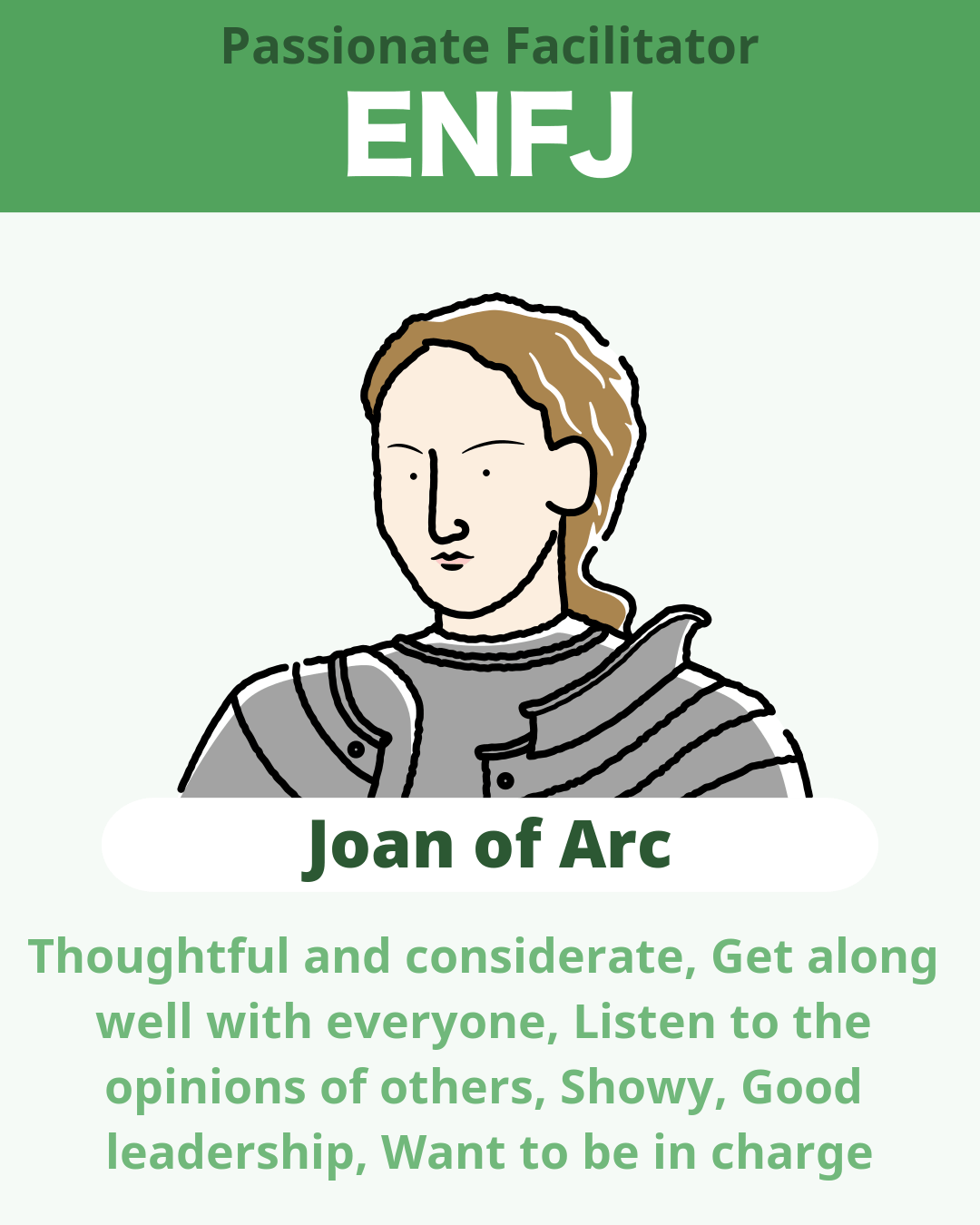
People with the ENFJ personality type, also known as the Protagonist personality type, are passionate, altruistic, and communicative individuals who are able to act for the benefit of others. They are often trusted and relied upon by those around them. They are good at keeping track of other people, take into account people's opinions to set goals, identifying problems, and coming up with solutions to those problems. ENFJs are good at leading teams and will do well at the head of organizations. Tolerance is also one of their traits, and they can bring teams together, listen to and work with the opinions and ideas of different people. They are naturally charismatic and attract others to them with their charm. However, ENFJs need to be careful not to overdo their concern for others, as they may come off as being nosy. They also have a sensitive and vulnerable side, and can easily get depressed if they brood over something.





| Ranks | Types | % | |
|---|---|---|---|
| 1 | INFP | Vincent van Gogh | 13% |
| 2 | ENFP | Anne Frank | 11% |
| 3 | ISFP | Mozart | 8% |
| 4 | INTP | Albert Einstein | 8% |
| 5 | INFJ | Nightingale | 8% |
| 6 | ESFJ | Andrew Carnegie | 7% |
| 7 | ISFJ | Mother Teresa | 7% |
| 8 | ESFP | Marie Antoinette | 6% |
| 9 | ENTP | Thomas Edison | 6% |
| 10 | ENFJ | Joan of Arc★ | 5% |
| 11 | ISTJ | Sigmund Freud | 4% |
| 12 | ISTP | Spartacus | 4% |
| 13 | INTJ | Leonardo da Vinci | 4% |
| 14 | ESTJ | George Washington | 3% |
| 15 | ESTP | Columbus | 3% |
| 16 | ENTJ | Napoleon | 3% |
The psychology of personality types divides people into 16 basic types based on their likes and dislikes and how they act. They help us learn more about ourselves and others, which helps us develop better ways to talk to each other and improve our relationships with others. The ENFJ personality type is among the most charismatic because it is full of passion, idealism, and willingness to do the right thing.
In the 1960s, American writers Katharine Cook Briggs and her daughter Isabel Briggs Myers made the Myers-Briggs Type Indicator based on the 16 personality types. Their 4-scale system was so popular and easy to understand that several current personality theories still use it. For example, "ENFJ" is used in multiple personality types.
The E in ENFJ stands for extroversion, which shows where you focus your attention and get your energy. Extroverts get their energy from being involved with people and events, and being around other people makes them happy.
They like to make things happen and move ideas from the mind to the real world. They understand problems better when they talk about them with other people. They often do their best work in groups and teams.
The N in ENFJ stands for intuition, meaning you get the most important information from your intuition. Intuitive people are good at noticing patterns, theories, and symbols. They are also good at thinking in abstract terms and weighing different options.
They like to think about problems and come up with many possible solutions, even if their ideas aren't always useful immediately. They tend to think about the future and remember the past more regarding ideas and feelings than specifics.
The F in ENFJ stands for feeling, which is how you make most of your decisions. People with feelings try to make the best choice in every situation by considering all the people and points of view.
ENFJs greatly desire to assist others and improve the world, and their charm allows them to attract others who share their sentiments. They care more about making and keeping the peace than being right or consistent. Feeling types are kind, caring, and diplomatic and do not hurt other people's feelings.
The J in ENFJ needs to stand for judging, which shows how you like to act around other people. People with a judging personality type tend to be structured and organized, which gives them the feeling that their future is planned and under control.
They are good at making choices and like to work in a planned way to reach their goals. They stick to schedules to be on time and fulfill deadlines without rushing, and they often choose to work and first play later. The ENFJ personality type is called The Protagonist because of all these traits.
ENFJs must perform for the greater good, try to enhance the world, and always do the proper thing, even when difficult. They have the passion, charisma, and effective communication to build strong teams, connections, and families.
They are born leaders with the drive and charisma to inspire others. Even though ENFJs are always willing to speak up if they observe something wrong, their genuine heat and care often help them find common ground and good solutions instead of starting a fight.
They are good team leaders because they can get everyone on the same page, and their natural organization skills help them stick to plans. It makes sense that many politicians and activists have this personality.
ENFJs get along well with others and are good at building relationships, fostering harmony, and bringing teams together. Since they are so honest and kind, other people are naturally drawn to join their causes, follow their lead, and work with them. They are also motivating and inspiring, and they can get along with people of all different types.
An ENFJ has a powerful sense of what is right and will stand up for it. They want to help people and improve the world, and their charisma helps them find people who share this goal. They also use strong emotional appeals to help settle disagreements and spread peace and harmony.
A person with an ENFJ personality type is truly happy when they see others happy and successful. So, they will focus on taking care of the people they care about, the factors that they are working for, and the promises they have made, and they will give generously when they can.
The ENFJ is reliable and has a good sense of organization. They do what they declare they will do and reach their goals. They are also trustworthy, which makes them great friends, business partners, and leaders.
Even though an ENFJ's strong morals might start making them seem judgmental, they are open to fresh knowledge, ideas, and points of view. They are always willing to look at things from someone else's point of view and think about how they feel.
The ENFJ enjoys conversations and gets a lot of energy from talking and getting feedback. When ENFJ doesn't get a lot of communication and support, those can quickly feel down and lose motivation.
Because they care greatly about ensuring everyone is happy and getting along, they often focus too much on making others happy while neglecting their needs. Even when honesty is needed, it will be hard for an ENFJ to tell hard truths that might cause conflict.
Even though ENFJs want the support of other people and are great at working with others, they can also be very stubborn. For instance, when an ENFJ feels that one‘s values aren't being respected or someone is being wronged, they could become rigid and stop being as open as usual.
ENFJs want to change the world and think everyone else should want to do the same. They sometimes get so engrossed in their ideals that they don't think things through, and people who don't share their values can easily trick them.
ENFJs want to help others and are good at working with others, but they can also be stubborn. When things and people let an ENFJ down, they can start taking it very individually, questioning themselves and putting the blame on themselves when it's not their fault.
Because ENFJs care so much about other people's happiness and well-being, they can be too protective of them. Unfortunately, their constant desire to help can sometimes come off as condescending and isn't always received how they meant it to be.
ENFJs can do well in a lot of different jobs. Finding a job that lets them use their natural skills and strengths is one of the most important things. ENFJs are very sensitive and caring people with a knack for learning about others and figuring out their feelings.
Many ENFJs are drawn to helping professions like psychology, counseling, social work, and teaching because they can be very empathic. But ENFJs can also do well in many other types of jobs.
A person with this personality type is kind, warm, and has a big heart. With these qualities, you can care for patients well and connect with people of all ages. As nurse practitioners, ENFJs are great at counseling and caring for their patients because they are natural leaders with great communication skills.
People like ENFJs because they are warm, honest, and sensitive. They honestly talk to people, which helps them figure out what customers need so they can give better service. The ENFJ personality type loves to help others because it allows them to feel valued, respected, and needed. ENFJS needs to do important work that helps the world as a whole.
Occupational therapists help people with physical, mental, sentimental, and social disabilities return to living independently. They do this by helping people learn new skills, get used to changes in their lives, and deal with their feelings. ENFJs like working one-on-one with patients to help them get back on their feet.
ENFJs are naturally good at helping others and genuinely want to care for them. They get along well with other people, which helps them speak well and solve problems. ENFJs are also usually very organized, which helps them do their jobs well in the medical field. ENFJs will enjoy working one-on-one with doctors as they help them give great care to patients.
ENFJs are usually very good at taking control of an event and making it a good place for everyone to work. They want everyone on a team to work toward the same goal, making them great trainers and developers. ENFJs also tend to talk clearly and concisely, which is essential in this role.
ENFJs are very kind and genuinely care about how other people feel. They are naturally good at connecting with people emotionally, making them great listeners who understand their patients' needs. For a good psychologist, this is a must.
The ENFJ personality type is rare, making up only about 2-5% of the general population and 1-4% of women. Even though this type is rare, politicians have a lot of them. Barack Obama and Justin Trudeau are two of the most well-known ENFJs today. The following are some other good jobs for an ENFJ:
The Protagonist's best quality will likely remain their ability to connect with and talk to people, so they should look for jobs, relationships, and ways of living that involve many people. If ENFJ can't talk to, work with, and help the people around them, they can rapidly become unhappy and lose motivation.
But most ENFJs can grow if they pay more attention to their inner lives. There can be a gap between the values that promote happiness on the outside and group harmony and those that are truly morally right and fair. These differences can be hard for ENFJs to understand.